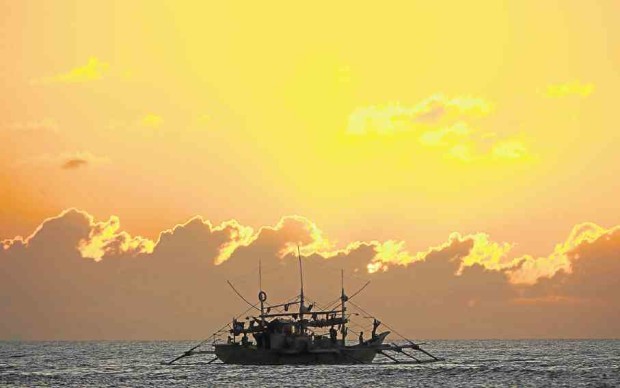Zambales fishers won’t take Chinese bait

DISPUTED TERRITORY A Filipino fishing vessel ventures into the Panatag (Scarborough) Shoal in the West Philippine Sea. —REM ZAMORA
OLONGAPO CITY—A five-day visit to China in January failed to convince some leaders of Zambales and Palawan fishing communities to accept aquaculture technology being offered by the Chinese government.
Leo Cuaresma, chair of Federated Fishermen Association of Masinloc in Zambales, said he and 15 other fishermen went to China on the invitation of Chinese fishery officials to observe the coastal aquaculture industry there.
“What we saw were fish cages built in open sea. China is using advanced technology in running these cages but this kind of aquaculture has negative environmental impact,” Cuaresma said.
Cuaresma and fishermen from Zambales and Palawan provinces were joined by officials of the Bureau of Fisheries and Aquatic Resources (BFAR) when they visited aquaculture farms in the cities of Shenzhen and Guangzhou in Guangdong in southern China.
“China’s fishery officials would like to tap Filipino fishermen in production of cultured fish because they don’t have enough to support their local consumption,” Cuaresma said.
In November last year, Liu Sinchong, assistant director of China’s department of fisheries, visited fishermen in Masinloc town and offered them training on Chinese aquaculture.
Liu, during a dialogue with local fishermen, said Chinese President Xi Jinping had directed him to talk with Filipino fishermen and offer the Chinese government’s help to those displaced by the territorial row over the Scarborough Shoal.
Scarborough, also known as Panatag Shoal or Bajo de Masinloc, is some 230 kilometers from the Zambales coastline and serves as a traditional fishing ground for Filipinos.
China seized the shoal from the Philippines after a two-month standoff in 2012. It continues to hold the shoal in spite of a 2016 ruling won by the Philippines from the Permanent Court of Arbitration.
“China is the No. 1 aquaculture country in the world and 80 percent of our fish are cultured so we will help you develop aquaculture facilities here,” Liu told the fishermen last year.
But Cuaresma likened China’s proposal to a “lollipop” being offered to appease a crying child since, he said, Filipino fishermen sailing to the shoal were harassed by the Chinese Coast Guard.
But he said he joined the trip to observe what China had to offer.
The fishermen and BFAR officials, led by Central Luzon Director Wilfredo Cruz, visited a fishery station, a marine cage culture farm, a fish market and a tilapia farm in Guangdong province.
They met with Liu and other Chinese officials who organized workshops as part of the visit, which took place from Jan. 9 to 13.
“China is determined to show that it is sincere in reaching out to Filipino fishermen. They are apologetic and they would like to build good ties with our country,” Cuaresma said.
While they were impressed by China’s advanced technology in the aquaculture industry, Cuaresma said they observed that the “water where the fish cages are built has turned murky.”
“We asked the Chinese officials how they protect the sea but they can’t give us an answer,” he said.
He noted that despite being operated in open sea, there were no healthy corals and sea grass underneath the fish pens.
“This is proof that they are focused on production alone. The Chinese are not concerned about protecting the environment and we can’t do that in the Philippines,” he said.
Despite this impression, Cuaresma said they remained open to any assistance that the Chinese government would give them.
“We were told that China will give us a multimillion-peso funding to help develop our fishery industry. We can accept such funding but not their fish-growing technology,” he said.
The tour was arranged by the Chinese government after the state visit of President Duterte to China in October last year.














